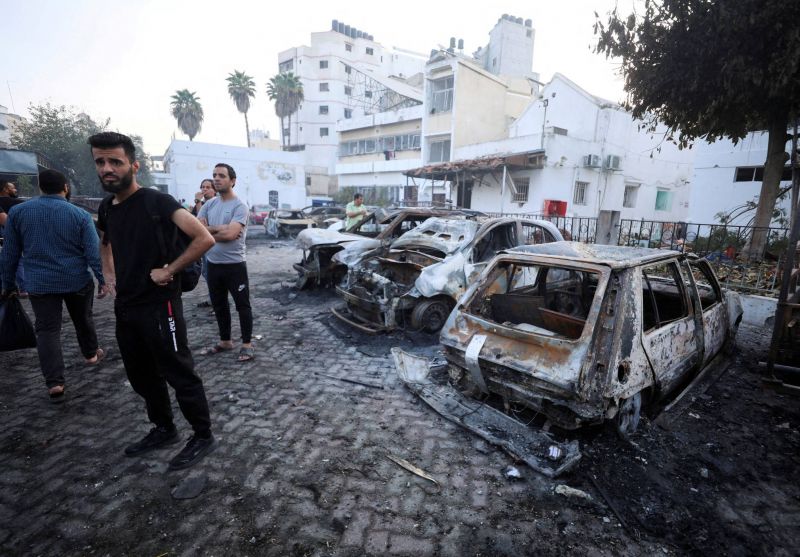
In Gaza City, people inspect the parking lot of the al-Ahli Arab Hospital where there is the site of the impact of a shot that hit the facility the day before, on the evening of Tuesday, Oct. 17. (Credit: Mohammed al-Masri/Reuters)
In a report published by Human Rights Watch, the international organization found that the Oct. 17 explosion at al-Ahli Hospital in northern Gaza was most likely caused by a rocket "commonly used by Palestinian armed groups," but that further investigation was needed to determine who fired the rocket and whether or not any laws of war were violated.
According to the report, at 6:59 p.m., a munition that Human Rights Watch says it was unable to identify hit a paved area inside of the al-Ahli Hospital compound where civilians had gathered for safety amid the ongoing Israeli bombardment of Gaza following the Oct. 7 attack by Hamas. The explosion, according to Gaza's health ministry, killed 471 people and injured an additional 342 – although Human Rights Watch was unable to independently confirm these numbers and they are significantly higher than other estimates.
Call for further investigation
Following the explosion, the Gazan health ministry was quick to blame Israel while Israel said that it was a rocket that misfired by Islamic Jihad, an armed Islamist group in Gaza allied with Hamas. Neither side provided any conclusive evidence to prove either claim.
"The decades-long failure of both Israeli and Palestinian authorities to credibly and impartially investigate alleged violations of international humanitarian law underscores the need for an independent investigation into the incident, which could be conducted by the United Nations Commission of Inquiry, and for all parties to fully cooperate," the report stated.
Human Rights Watch came to its conclusion by analyzing publicly available photographs, videos and satellite images before, during and after the explosion as well as interviewing five witnesses of the explosion and its aftermath to determine, to the best of its ability, what caused the explosion.
There are no known images of the munition publicly available with Gazan authorities taking possession of the remnants. Despite saying that they would make them public at the end of October, this has yet to come to fruition while other Gazan officials have stated that there were no remnants remaining as, according to Ghazi Hamad, a senior Hamas official and deputy minister in the Hamas-led government, "the missile has dissolved like salt in the water.… It’s vaporized. Nothing is left."
Not assigning blame
Through the information that it gathered, Human Rights Watch determined that a "rocket such as the larger types fired by Palestinian armed groups could inflict a high number of casualties if it struck with some of its propellant remaining in a courtyard packed with people and flammable materials."
The NGO acknowledged that it “was not able to go to the scene” and was “not able to conclusively identify” the remains of the fired projectile, “However, various factors – the noise preceding the explosion, the fireball triggered, the size of the resulting crater, the type of traces on the ground, and the type and pattern of fragmentation visible around the crater – are consistent all with the impact of a rocket," the report noted.
The report, however, did not assign blame to any specific group, saying that further investigation needed to be carried out to accurately determine the perpetrator.
While the report said that the chances of the explosion being caused by a "large air-dropped bomb, such as those Israel has used extensively in Gaza," is "highly unlikely," it did note that Israel, even if it did not perpetrate the explosion at al-Ahli Hospital, it has still carried out nearly 200 documented attacks on medical facilities, personnel and transports since the start of the war.
"The explosion at al-Ahli hospital is one of scores of strikes damaging medical facilities across Gaza that have killed civilians and medical professionals and denied many Palestinians access to desperately needed medical care," Ida Sawyer, crisis and conflict director at Human Rights Watch, is quoted as saying in the report. "Authorities in Gaza and Israel should release the evidence of munition remnants and other information they have regarding the al-Ahli hospital explosion to allow for a full investigation."